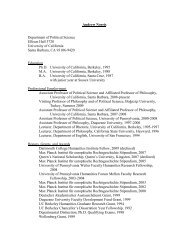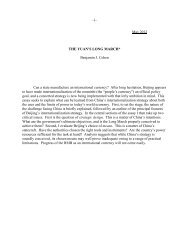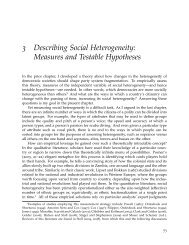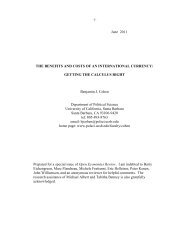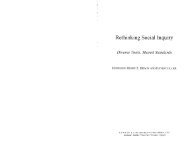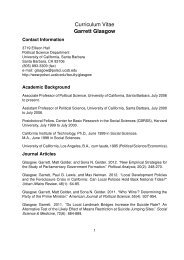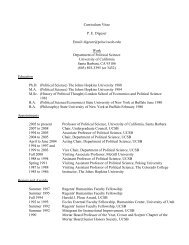Are Niche Parties Fundamentally Different from Mainstream Parties ...
Are Niche Parties Fundamentally Different from Mainstream Parties ...
Are Niche Parties Fundamentally Different from Mainstream Parties ...
Create successful ePaper yourself
Turn your PDF publications into a flip-book with our unique Google optimized e-Paper software.
ARE NICHE PARTIES DIFFERENT? 523<br />
candidates’ policy shifts in real-world elections via simulations<br />
on election survey data. 14<br />
Also note that the coefficient for the noncentrist policy<br />
shift × niche party variable is not statistically significant,<br />
indicating that there is no evidence that the electoral<br />
fortunes of niche parties differ <strong>from</strong> those of mainstream<br />
parties when they shift their Left-Right positions in a noncentrist<br />
direction. This result does not support the Costly<br />
Policy Shift Hypothesis, which states that in comparison<br />
to mainstream parties, niche parties are penalized electorally<br />
for shifting their policy programs, regardless of<br />
the direction of the policy shift.<br />
However, we do find evidence that compared to mainstream<br />
parties, niche parties are penalized for moderating<br />
their policies. The coefficient on the centrist policy shift ×<br />
niche party variable is negative and statistically significant<br />
(p < 0.02). This result supports the Costly Policy Moderation<br />
Hypothesis, that in comparison to mainstream<br />
parties, niche parties are penalized for moderating their<br />
policy programs.<br />
The estimated magnitude of the electoral penalties<br />
for niche parties that moderate their policy positions implies<br />
that these penalties are of considerable substantive<br />
significance. The expected electoral effect of a one-unit<br />
moderating shift by a niche party is –3.88, which is statistically<br />
significant (s.e. = 1.93, p = 0.046). 15 This implies<br />
that when a niche party shifts its policy position one unit<br />
closer to the center of the voter distribution along the 1–<br />
10 Left-Right scale, then, ceteris paribus, the party’s vote<br />
share will fall by nearly 4%. As discussed in the second<br />
section, this finding for niche parties may be due to the<br />
fact that policy shifts towards the center alienate party activists,<br />
who may view such policy moderation as a sign of<br />
pandering or “selling out” by the party’s elites. 16<br />
14 For summaries and descriptions of these studies, see Adams and<br />
Merrill (2005, 902–4).<br />
15 The method for calculating this conditional coefficient and standard<br />
error is explained in footnote 9.<br />
16 In addition, we note that important recent work on “policy balancing”<br />
models of voting behavior by Kedar (2004, 2005) and<br />
Hinich, Henning, and Shakano (2004) may illuminate the finding<br />
that niche parties are punished for shifting to more moderate policy<br />
positions (see also Adams, Merrill, and Grofman 2005; Grofman<br />
1985; Merrill and Grofman 1999). Roughly speaking, both sets of<br />
authors present arguments that moderately left-of-center or rightof-center<br />
voters may prefer that small parties present extreme policy<br />
positions (on the voter’s side of the issue dimension) because voters<br />
believe that in subsequent legislative deliberations these small<br />
parties’ extreme bargaining positions will “pull” government policy<br />
outputs in the voter’s preferred direction. (By contrast, moderate<br />
voters may fear that a large extremist party will actually succeed<br />
in implementing most of its policy agenda). Given that the niche<br />
parties in our data are mostly small parties, the arguments of Kedar<br />
and Hinich et al. may explain why such parties are punished espe-<br />
To the extent that niche parties’ elites anticipate these<br />
effects, the specter of the electoral reverses associated with<br />
moderating policy shifts surely provides a powerful incentive<br />
to maintain noncentrist policy images. Taken together,<br />
the estimated effects of policy shifts on the vote<br />
shares of niche and mainstream parties provide strong<br />
support for the Costly Policy Moderation Hypothesis, that<br />
in comparison to mainstream parties, niche parties are<br />
penalized for moderating their policy programs.<br />
Among the control variables, we estimate statistically<br />
significant electoral effects for public opinion shifts, with<br />
parties’ vote shares increasing when public opinion shifts<br />
towards their policy positions. This is consistent with findings<br />
reported in previous research (Erikson, MacKuen,<br />
and Stimson 2002; Ezrow 2005; McDonald and Budge,<br />
2005). We also find that the vote shares of centrist parties<br />
are hurt in comparison to peripheral parties when party<br />
policy positions are converging to the center of the policy<br />
space, as evidenced by the negative and statistically significant<br />
coefficient on the party policy convergence variable.<br />
Our estimates also suggest that parties’ vote shares decline<br />
when they are in government, with the electoral penalty<br />
being smaller for parties governing in a coalition than for<br />
a single-party government—however, these estimates are<br />
not statistically significant. Further, we do not find statistically<br />
significant evidence that voters hold governing<br />
parties responsible for the state of the economy, a result<br />
consistent with previous empirical research that reports<br />
only weak and inconsistent economic effects on support<br />
for governing parties in European elections (see Paldam<br />
1991; McDonald and Budge 2005).<br />
Sensitivity Analyses<br />
As with our test of the Policy Stability Hypothesis, we<br />
performed a series of tests to evaluate alternative explanations<br />
for our findings. First, several scholars have noted<br />
that institutional variables such as district magnitude can<br />
affect the electoral success of niche parties (e.g., Amorim<br />
Neto and Cox 1997; Golder 2003; Meguid 2005). While the<br />
electoral institutions of each country in our data remained<br />
stable over time, these institutions may have affected the<br />
electoral strategies of minor parties. For instance, minor<br />
parties in electoral systems with low district magnitude<br />
might have strategic reasons not to contest some districts<br />
in some elections (such as a desire to focus limited resources<br />
on a few districts or an election pact with another<br />
cially severely when they moderate their positions—i.e., that voters<br />
on the party’s side of the issue dimension believe that such policy<br />
moderation will dilute these parties’ bargaining positions in the<br />
legislative arena.



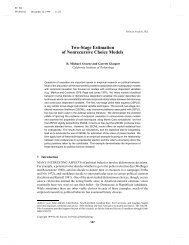
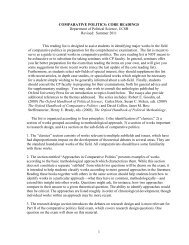
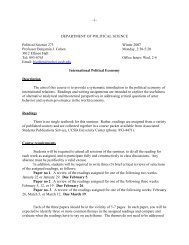
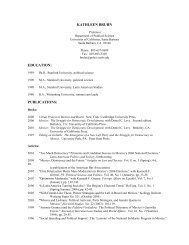
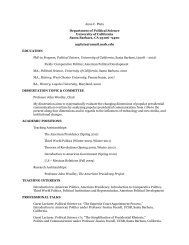
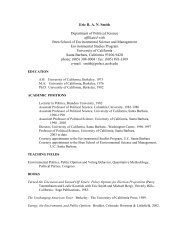
![Curriculum Vitae [abbreviated] John T. Woolley Professor of Political ...](https://img.yumpu.com/25423597/1/190x245/curriculum-vitae-abbreviated-john-t-woolley-professor-of-political-.jpg?quality=85)
